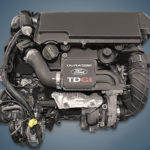The 1.8-liter Ford RTP, RTN, RTQ or 1.8 Endura-DI engine was produced from 1999 to 2002 and was installed only on the fourth generation of the Fiesta model in the restyled version. This diesel power unit, unlike its predecessor, has proven itself well.
The Endura-DI line also includes internal combustion engines: BHDA and C9DA.
The engine was installed on:
- Ford Fiesta Mk4 in 1999 – 2002.
Specifications
| Production years | 1999-2002 |
| Displacement, cc | 1753 |
| Fuel system | direct injection |
| Power output, hp | 75 |
| Torque output, Nm | 140 |
| Cylinder block | cast iron R4 |
| Block head | cast iron 8v |
| Cylinder bore, mm | 82.5 |
| Piston stroke, mm | 82 |
| Compression ratio | 19.4 |
| Features | no |
| Hydraulic lifters | no |
| Timing drive | chain and belt |
| Phase regulator | no |
| Turbocharging | yes |
| Recommended engine oil | 5W-30 |
| Engine oil capacity, liter | 5.7 |
| Fuel type | diesel |
| Euro standards | EURO 2 |
| Fuel consumption, L/100 km (for Ford Fiesta 2000) — city — highway — combined |
6.7 4.3 5.3 |
| Engine lifespan, km | ~250 000 |
Disadvantages of the RTP/RTN/RTQ engine
- This diesel engine is much more reliable than its predecessors and does not cause many problems;
- The main thing here is the residual life of the components of the direct injection fuel system;
- From time to time there are leaks at the junction of the upper and lower parts of the cylinder block;
- Clogged fuel filter is often the culprit for sudden power failures;
- When replacing a timing kit, it is important to use the correct replacement parts.






